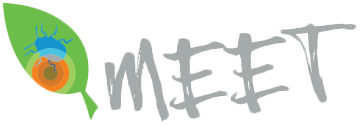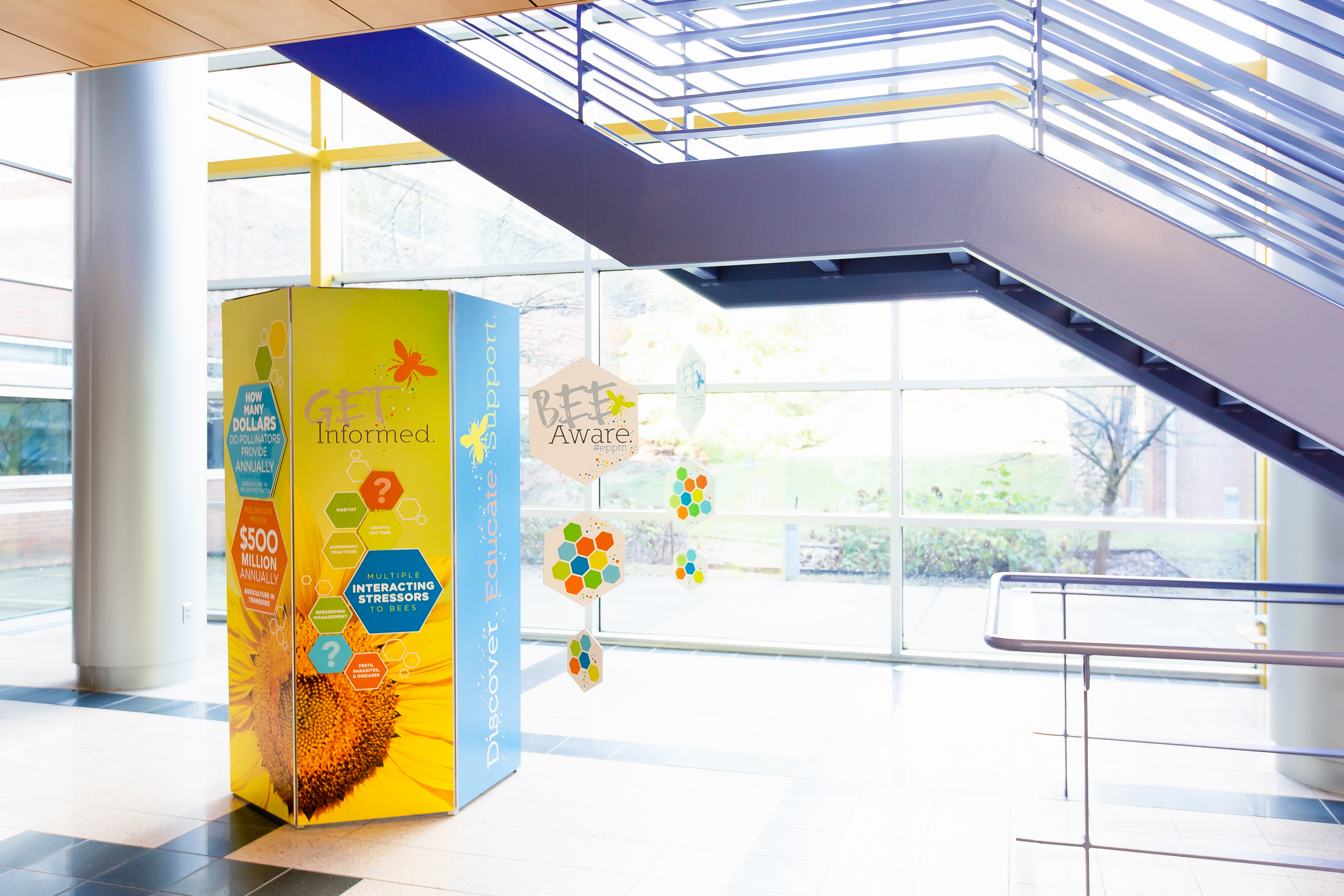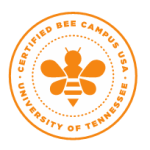I joined the Department of Entomology and Plant Pathology in February 2019 as an Assistant Professor and Apiculture Extension Specialist, with interests in bee health and management. Prior to joining UT, I was the Apiculture Specialist at Clemson University, a postdoctoral researcher at Purdue University (Dr. Greg Hunt’s lab), and received my Ph.D. at UC Davis under the advisement of Dr. Robert Page. I have worked on associations between foraging behavior, sensory responsiveness, and reproductive physiology in honey bees, as well as breeding for and genetically mapping behavioral resistance against parasitic Varroa mites. At UT, I coordinate the Tennessee Master Beekeeping Program, and participate in field days and other Extension programming for stakeholders and agents. My applied research program focuses on improving honey bee health through beekeeper management decisions and foraging resources, as well as science education for youth and the general public. The overall goals of my program are to support the beekeeping industry and community in Tennessee, and to increase the knowledge base of the citizens of Tennessee with respect to pollinators. This is achieved through the mentoring of graduate students and coordinated efforts with Extension personnel.


Research Focus
My academic appointment is 100% Extension but I maintain an applied research program that guides my Extension program, and vice versa. My applied research is aimed at improving honey bee management for beekeepers of all operation sizes and interests, and to better understand how to educate non-beekeepers on the impacts of pollinators and their services. Specifically, I am interested in improving disease/parasite management, sustainable production, monitoring for resistance, and decision-making for short-term and long-term planning. This research aims to lower honey bee colony losses (which have been as high as 70% in recent years) and improving the profitability and sustainability of beekeeping for Tennessee producers, and increasing satisfaction and enjoyment for Tennessee hobbyists. It also aspires to create better-informed citizens and advocates of pollinators, as well as landscapes that are functional and supportive for pollinators and other beneficial arthropods.

Extension and outreach focus
My Extension program aims to support and improve the sustainability of beekeeping and pollination services across Tennessee. To achieve this, I develop educational programming for diverse audiences (Extension agents, beekeepers, other stakeholder groups, youth, and the public) about disease and health issues as well as management practices and decision-making. Knowledge and recommendations are also shared through in-service trainings for Extension agents to allow for county-based assistance for beekeepers and people with interests in pollinators.
One feature of my Extension program is the Tennessee Master Beekeeping Program. I coordinate this state-wide, county-based educational opportunity for agents and specialists to share unbiased, research-based information on current issues and best management practices with stakeholders. Other educational programming is delivered through presentations at UT Field Days, presentations to local beekeeping groups and other stakeholder groups, as well as publications and other media.
I am also working with a great collaborative group of students, staff, and faculty at UTK to make the campus a certified Bee Campus affiliate of Bee City USA. This initiative aims to increase awareness of the importance of bees across our community. We focus on increasing bee habitat across campus, practicing pollinator-friendlier strategies for managing these habitats, and providing educational opportunities to ensure the survival of bees and the sustainable pollination services for the landscape.

Teaching focus
While my academic appointment does not include teaching, my Extension work clearly focuses on education and training related to beekeeping and pollinators. I am always looking for motivated individuals to join my program and promote diverse perspectives in beekeeping and science. With opportunities to study bees in the field, in the lab, and in the classroom, individuals are exposed to multiple and integrated layers of bee biology. This approach fosters the discovery of which areas interest each individual, aiding me in identifying ways to support their success.
Courses
Guest lecture provided in: EPP 201 – Impact of Insect and Plant Diseases on Human Society (Bees and Beekeeping)

JENNIFER TSURUDA
Assistant Professor
office (865) 974-0209
EPP Main office (865) 974-7135
jtsuruda@utk.edu
*due to frequent travel, email correspondence is preferred
370 Plant Biotechnology Building
2505 EJ Chapman Drive
Knoxville, TN 37996-4560
EDUCATION
B.S., Animal Biology, University of California, Davis
M.S., Entomology, University of California, Davis
Ph.D., Entomology, University of California, Davis
WEBSITE
UT Apiculture
UTK Bee Campus

PROFESSIONAL APPOINTMENT
100% Extension
GRADUATE PROGRAM CONCENTRATIONS
Sustainable Disease and Integrated Pest Management Systems
Organismal Biology, Ecology, and Systematics
AREAS OF EXPERTISE
Apiculture, Pollination Biology, Genetics, Foraging Behavior
KEY WORDS
honey bees, beekeeping, bee biology, Varroa mites, genetics, foraging, management

RESEARCH QUESTIONS IN OUR LABORATORY

CURRENT LAB MEMBERS
INFORMATION FOR PROSPECTIVE STUDENTS AND POSTDOCTORAL RESEARCHERS
Please contact me if you are interested in learning more about research and education opportunities in my program.
SELECTED PUBLICATIONS
Tsuruda J, Chakrabarti P, Sagili R (2021) Honey Bee Foraging Behavior and Nutrition – Research and Application. Veterinary Clinics: Food Animal Practice 37(3). doi: 10.1016/j.cvfa.2021.06.006.
Waiker P, Baral S, Goss A, Bhatia S, Rueppell A, Le K, Amiri E, Tsuruda J, Rueppell O (2019) Foraging and homing behavior of honey bees (Apis mellifera) during a total solar eclipse. The Sci of Nature 106:4. doi: 10.1007/s00114-018-1597-2
EXTENSION AND POPULAR PRESS PUBLICATIONS
Tsuruda, J., Vail, K. (in press) Carpenter Bees: Uninvited Houseguests Who Do Not Take A Hint. Tennessee Greentimes 23(1). https://www.tnla.com/
Tsuruda, J. (2021) What’s the buzz? Enthusiasts Can Engage in At Home Beekeeping: A Monthly Webinar Series. Tennessee Greentimes 22(4). https://www.tnla.com/
Shoemaker, D., Stewart, S., Vail, K., Tsuruda, J., Richards, J., Amarasekare, K. (2020) 4-H Entomology/Beekeeping. University of Tennessee Extension. W 927-A, B, C.
Hietala, L., K. M. Vail, J. A. Skinner, A. M. Taylor, L. A. Russo, J. M. Tsuruda, and P. Rhoades. (2020) Nature’s Right-Angle Drill: Carpenter Bees. University of Tennessee Extension. W 876.






